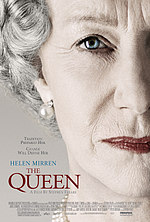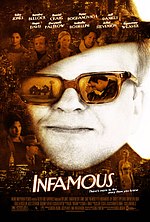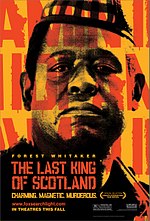
Knight at the Movies Archives
Three juicy biopics to chew on -- it must be Oscar season
A flood of biopics are beginning to hit theatres signaling that Oscar season is about to move into high gear. Helen Mirren as Queen
Elizabeth II in The Queen and Forest Whitaker as the late Ugandan dictator Idi Amin in The Last King of Scotland have already drawn
considerable Oscar buzz and for good reason. These are riveting, full bodied portraits of two historical figures, both controversial in
their own way, and both movies which contain them are grand entertainments. Toby Jones as Truman Capote in Infamous, also out
this week, alas, has both the bad fortune to follow on the heels of Philip Seymour Hoffman’s triumph of last year (capped by his
Oscar win) as the diminutive gay writer and the added burden of playing in a movie that covers the same time period as its
predecessor. But though Infamous isn’t of the Oscar caliber that Capote was (nor is Jones’ portrait), it’s the kind of biopic that will
appeal to a much wider audience than the chilly Capote did. Like The Queen and The Last King, it’s good and juicy and pulls back the
curtain on its controversial public figures.
But first The Queen: it makes perfect sense that when we first encounter Mirren’s Queen Elizabeth she is sitting for yet another
royal portrait. It is May of 1997 and Anthony “call me Tony” Blair has just won a victory for the liberals. Within seconds, in an
exchange between Mirren and the artist capturing her bland features we get a complete sense of this rigid woman with her preference
for traditional values, her quick, dry wit, and her absolute regal certainty. As she stares directly into the camera we see this stickler
for protocol above all else and noting the date and the ascent of Blair, sense the shake up to come.
It’s just months before the tragic accident that killed Princess Diana (which director Stephen Frears recreates) in the fall of 1997 and
with a quick one-two punch, the entire royal family would find themselves cast as the villains of the hysterical mourning period that
followed. Frears takes us behind the scenes during the week after the accident to Balmoral, the Queen’s private residence where
Elizabeth, the distinctly sour Prince Philip (James Cromwell note perfect), the mewling, bitter always the bridesmaid never a king
Prince Charles (Alex Jennings), Sylvia Syms as the whiskey swilling Queen Mother, and Diana’s sons are spending their vacation.
When Blair (Michael Sheen) phones up to offer condolences and ask the Queen for a statement from the royals and the possibility
of a state funeral she snaps “This is a family funeral not a fairground attraction” and abruptly hangs up on him after arguing instead
for a period of “restrained grief.”
But as the hysteria mounts and the pressure builds, Elizabeth is slowly shaken out of her cocoon of privilege and tenacious fealty to
her God ordained duty. The contrast between the privileged, wanton isolation of the royals and the messy, modern day Blair’s who
are larger versions of the English people is striking (emphasized when Blair dubs Diana the “people’s princess” a phrase that
nauseates the royals).
Elizabeth’s gradual awakening is beautifully realized in screenwriter Peter Morgan’s made up subplot of Elizabeth’s sighting of a rare,
lone imperial stag roaming the vast grounds of Balmoral when her beat up land rover gets stuck crossing a river. Large moments
like this allow Mirren the rare chance to show a moment of warmth beneath the icy good manners but Mirren’s portrayal also offers
plenty of small ones as well (the only time she smiles is in passing when addressing her beloved corgi’s for example). The film is
sumptuously designed, shot and scored and Mirren is magnificent, heading a marvelous cast. The whole is the equivalent of a rich
desert but a decidedly semi-sweet one.
The critical hosannas for Mirren are being matched by Forest Whitaker (he’s already made the pilgrimage to Oprah, in true Jamie
Foxx Ray fashion, first stop on the way to the Oscar ceremony) for The Last King of Scotland. Again, they are deserved. The
role of Idi Amin, the crazed crackpot who ended up killing 300,000 of his countrymen during his dictatorial reign in the 1970s is
perfect for the rather odd talents of Whitaker (a gentle giant who looms over costar James McAvoy and everyone else on screen). As
he alternates between childlike enthusiasm, blistering verbal attacks on his enemies, and back to joking in the flash of a second one
watches with fascination. This grinning, deadly megalomaniac is breathtaking to behold.
Inspired by real events, the movie traces McAvoy as a young Scottish doctor who has come to Uganda on a whim, his accidental first
encounter with Amin, his quick rise to eminence when Amin improbably makes him his personal physician, and the eventual terror
that overtakes Garrigan and everyone around Amin as his quest to hang on to his power overwhelms everything around him. Nice
support is offered by Kerry Washington, Gillian Anderson and Simon McBurney. This is the first non-documentary feature for director
Kevin Macdonald (whose One Day In September won the Oscar in 2000). It’s a tense, riveting cautionary tale of innocence and
bravado vs. the paranoic effect of power. (I wrote a bit more about the film in last week's "Knight Thoughts." Click HERE to read.)
The unsung star of both movies is Peter Morgan who wrote the screenplays for each. Based on the rich detail offered in both films
Morgan is apparently an avid researcher, and he has written scripts that offer tantalizing, complex glimpses into the lives of not just
his leading characters but his supporting ones as well. And the dialogue and motives for the characters in scenes obviously based
on conjecture don’t have the made up, psychological explanation, oh come on feel that biopic scripts usually contain.
Douglas McGrath’s script for Infamous (which he also directed) goes a much more gossipy route, not entirely inappropriate given
its focus on Truman Capote. As noted, thanks to last year’s much praised Capote, the story of the elfin gay writer, toast of New York
society, who traveled to Kansas to cover the murder of the Clutter family and ended up identifying too strongly with one of their
killers in the service of producing his one bona fide masterpiece, “In Cold Blood,” is familiar.
But McGrath based his script on George Plimpton’s lighter in tone oral biography rather than Gerald Clarke’s more psychologically in-
depth one and the resulting film is also much lighter. This Tru (character actor Toby Jones in his first starring role) likes to go to
nightclubs and listen to Peggy Lee (an improbable Gwyneth Paltrow in a cameo) sing “What Is This Thing Called Love,” and dish with
his high society “swans” (played with relish by Sigourney Weaver, Hope Davis, Isabella Rossellini, and a memorable Juliet Stevenson
as fashion priestess Diana Vreeland). Now it’s Truman’s celebrity name dropping – Humphrey Bogart, Ava Gardner, Jennifer Jones,
Marilyn Monroe – that finally gains entry to the closed off Kansans not Harper Lee’s ability to charm and smooth the way (and Sandra
Bullock seems to be along for the ride rather than a true collaborator as Lee was portrayed by Catherine Keener in the previous
version).
The movie also includes many more nods to the Elephant in the Room – Capote’s flaming homosexuality and nellie ways so out of
place in Kansas in 1959 – and doesn’t skimp on the male eye candy either. Time and again James Bond hunk Daniel Craig as killer
Perry Smith is shown lolling fetchingly in a wife beater, eyes smoldering. McGrath also makes explicit the rumored gay affair
between Capote and Smith (right down to a big ole French kiss). Even teenaged male murder victim Kenneth Clutter is glimpsed
shirtless and panting. Repressed homosexuality on Smith’s part as a motive for the murders is even offered up. This
homoeroticsm of the events will please many that found it missing from Bennett Miller’s film (and I, who loved Miller’s movie, ain’t
complainin’).
Where Miller’s Capote was the complex morality play of a self centered writer destroyed by the guilt over lies he told his subject to
gain his trust in order to create a work of art, Infamous is its gossipy cousin – a soap opera tale of a vane, foolish fop done in after
choosing ill gotten fame and wealth via a bestseller over the chance for True Happiness with the rough trade that had the foolishness
to fall in love with him. If Capote was the cinematic equivalent of a gourmet meal savored long after being finished, Infamous is a
bag of chips, quickly and greedily devoured and quickly tossed away.
Elizabeth II in The Queen and Forest Whitaker as the late Ugandan dictator Idi Amin in The Last King of Scotland have already drawn
considerable Oscar buzz and for good reason. These are riveting, full bodied portraits of two historical figures, both controversial in
their own way, and both movies which contain them are grand entertainments. Toby Jones as Truman Capote in Infamous, also out
this week, alas, has both the bad fortune to follow on the heels of Philip Seymour Hoffman’s triumph of last year (capped by his
Oscar win) as the diminutive gay writer and the added burden of playing in a movie that covers the same time period as its
predecessor. But though Infamous isn’t of the Oscar caliber that Capote was (nor is Jones’ portrait), it’s the kind of biopic that will
appeal to a much wider audience than the chilly Capote did. Like The Queen and The Last King, it’s good and juicy and pulls back the
curtain on its controversial public figures.
But first The Queen: it makes perfect sense that when we first encounter Mirren’s Queen Elizabeth she is sitting for yet another
royal portrait. It is May of 1997 and Anthony “call me Tony” Blair has just won a victory for the liberals. Within seconds, in an
exchange between Mirren and the artist capturing her bland features we get a complete sense of this rigid woman with her preference
for traditional values, her quick, dry wit, and her absolute regal certainty. As she stares directly into the camera we see this stickler
for protocol above all else and noting the date and the ascent of Blair, sense the shake up to come.
It’s just months before the tragic accident that killed Princess Diana (which director Stephen Frears recreates) in the fall of 1997 and
with a quick one-two punch, the entire royal family would find themselves cast as the villains of the hysterical mourning period that
followed. Frears takes us behind the scenes during the week after the accident to Balmoral, the Queen’s private residence where
Elizabeth, the distinctly sour Prince Philip (James Cromwell note perfect), the mewling, bitter always the bridesmaid never a king
Prince Charles (Alex Jennings), Sylvia Syms as the whiskey swilling Queen Mother, and Diana’s sons are spending their vacation.
When Blair (Michael Sheen) phones up to offer condolences and ask the Queen for a statement from the royals and the possibility
of a state funeral she snaps “This is a family funeral not a fairground attraction” and abruptly hangs up on him after arguing instead
for a period of “restrained grief.”
But as the hysteria mounts and the pressure builds, Elizabeth is slowly shaken out of her cocoon of privilege and tenacious fealty to
her God ordained duty. The contrast between the privileged, wanton isolation of the royals and the messy, modern day Blair’s who
are larger versions of the English people is striking (emphasized when Blair dubs Diana the “people’s princess” a phrase that
nauseates the royals).
Elizabeth’s gradual awakening is beautifully realized in screenwriter Peter Morgan’s made up subplot of Elizabeth’s sighting of a rare,
lone imperial stag roaming the vast grounds of Balmoral when her beat up land rover gets stuck crossing a river. Large moments
like this allow Mirren the rare chance to show a moment of warmth beneath the icy good manners but Mirren’s portrayal also offers
plenty of small ones as well (the only time she smiles is in passing when addressing her beloved corgi’s for example). The film is
sumptuously designed, shot and scored and Mirren is magnificent, heading a marvelous cast. The whole is the equivalent of a rich
desert but a decidedly semi-sweet one.
The critical hosannas for Mirren are being matched by Forest Whitaker (he’s already made the pilgrimage to Oprah, in true Jamie
Foxx Ray fashion, first stop on the way to the Oscar ceremony) for The Last King of Scotland. Again, they are deserved. The
role of Idi Amin, the crazed crackpot who ended up killing 300,000 of his countrymen during his dictatorial reign in the 1970s is
perfect for the rather odd talents of Whitaker (a gentle giant who looms over costar James McAvoy and everyone else on screen). As
he alternates between childlike enthusiasm, blistering verbal attacks on his enemies, and back to joking in the flash of a second one
watches with fascination. This grinning, deadly megalomaniac is breathtaking to behold.
Inspired by real events, the movie traces McAvoy as a young Scottish doctor who has come to Uganda on a whim, his accidental first
encounter with Amin, his quick rise to eminence when Amin improbably makes him his personal physician, and the eventual terror
that overtakes Garrigan and everyone around Amin as his quest to hang on to his power overwhelms everything around him. Nice
support is offered by Kerry Washington, Gillian Anderson and Simon McBurney. This is the first non-documentary feature for director
Kevin Macdonald (whose One Day In September won the Oscar in 2000). It’s a tense, riveting cautionary tale of innocence and
bravado vs. the paranoic effect of power. (I wrote a bit more about the film in last week's "Knight Thoughts." Click HERE to read.)
The unsung star of both movies is Peter Morgan who wrote the screenplays for each. Based on the rich detail offered in both films
Morgan is apparently an avid researcher, and he has written scripts that offer tantalizing, complex glimpses into the lives of not just
his leading characters but his supporting ones as well. And the dialogue and motives for the characters in scenes obviously based
on conjecture don’t have the made up, psychological explanation, oh come on feel that biopic scripts usually contain.
Douglas McGrath’s script for Infamous (which he also directed) goes a much more gossipy route, not entirely inappropriate given
its focus on Truman Capote. As noted, thanks to last year’s much praised Capote, the story of the elfin gay writer, toast of New York
society, who traveled to Kansas to cover the murder of the Clutter family and ended up identifying too strongly with one of their
killers in the service of producing his one bona fide masterpiece, “In Cold Blood,” is familiar.
But McGrath based his script on George Plimpton’s lighter in tone oral biography rather than Gerald Clarke’s more psychologically in-
depth one and the resulting film is also much lighter. This Tru (character actor Toby Jones in his first starring role) likes to go to
nightclubs and listen to Peggy Lee (an improbable Gwyneth Paltrow in a cameo) sing “What Is This Thing Called Love,” and dish with
his high society “swans” (played with relish by Sigourney Weaver, Hope Davis, Isabella Rossellini, and a memorable Juliet Stevenson
as fashion priestess Diana Vreeland). Now it’s Truman’s celebrity name dropping – Humphrey Bogart, Ava Gardner, Jennifer Jones,
Marilyn Monroe – that finally gains entry to the closed off Kansans not Harper Lee’s ability to charm and smooth the way (and Sandra
Bullock seems to be along for the ride rather than a true collaborator as Lee was portrayed by Catherine Keener in the previous
version).
The movie also includes many more nods to the Elephant in the Room – Capote’s flaming homosexuality and nellie ways so out of
place in Kansas in 1959 – and doesn’t skimp on the male eye candy either. Time and again James Bond hunk Daniel Craig as killer
Perry Smith is shown lolling fetchingly in a wife beater, eyes smoldering. McGrath also makes explicit the rumored gay affair
between Capote and Smith (right down to a big ole French kiss). Even teenaged male murder victim Kenneth Clutter is glimpsed
shirtless and panting. Repressed homosexuality on Smith’s part as a motive for the murders is even offered up. This
homoeroticsm of the events will please many that found it missing from Bennett Miller’s film (and I, who loved Miller’s movie, ain’t
complainin’).
Where Miller’s Capote was the complex morality play of a self centered writer destroyed by the guilt over lies he told his subject to
gain his trust in order to create a work of art, Infamous is its gossipy cousin – a soap opera tale of a vane, foolish fop done in after
choosing ill gotten fame and wealth via a bestseller over the chance for True Happiness with the rough trade that had the foolishness
to fall in love with him. If Capote was the cinematic equivalent of a gourmet meal savored long after being finished, Infamous is a
bag of chips, quickly and greedily devoured and quickly tossed away.
Biopics:
The Queen-The Last King of Scotland-Infamous
Expanded Edition of 10-11-06 Knight at the Movies Column
By Richard Knight, Jr.
The Queen-The Last King of Scotland-Infamous
Expanded Edition of 10-11-06 Knight at the Movies Column
By Richard Knight, Jr.



